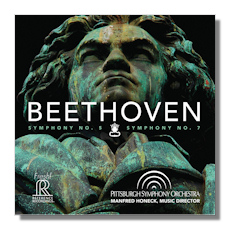
The Internet's Premier Classical Music Source
Related Links
- Beethoven Reviews
- Latest Reviews
- More Reviews
-
By Composer
-
Collections
DVD & Blu-ray
Books
Concert Reviews
Articles/Interviews
Software
Audio
Search Amazon
Recommended Links
Site News
 CD Review
CD Review
Ludwig van Beethoven

- Symphony #5 in C minor, Op. 67
- Symphony #7 in A Major, Op. 92
Pittsburgh Symphony Orchestra/Manfred Honeck
Reference Recordings fresh! FR-718 Hybrid Multichannel SACD
On a completely subjective note, few releases on the market excite me as much as those from Reference Recordings. Long-known for superlative sound quality and intelligent repertoire selection, they have recently focused on getting the very best from American orchestras. Pittsburgh and Kansas City are similar musically to their baseball counterparts in that they are respected but often considered "small market" clubs. Well, the Pirates and Royals have been winning like crazy the last few years, and the same goes for their orchestras. Manfred Honeck has the Pittsburgh Symphony Orchestra attacking warhorses and allowing us to hear music anew. We didn't exactly need another coupling of Beethoven's Fifth and Seventh Symphonies, but this team has proved that they can rise to the challenge.
In his very detailed and persuasive notes, Honeck gives – perhaps surprisingly in this day and age – credit to the conductors he played under and worked with. He also acknowledges the history of his orchestra (William Steinberg recorded these works partially for Capitol and as a cycle for Command), and other artists' performing traditions. Whether you need his bar by bar analysis is up to you, but all this does demonstrate that there was genuine thought that went into this project. Honeck is also able to explain his instructions to the orchestra, and his personal thoughts on the music at hand. It is slightly overwhelming, but most of us own (or if we are new collectors, plan to own) some versions of these pieces. So it is fair to go deeper, especially on an audiophile label like Reference Recordings. For those of you wondering, neither the press release nor conductor make mention of the editions used, and I could care less.
The opening of Honeck's Fifth is weighty without being mannered, and harks back to an older tradition of Beethoven. But only briefly, as the rest of the movement is unusually swift and urgent. Though he seeks to create tension within the famous opening, he is equally able to find the beauty and excitement in this music. The now-famous Pittsburgh horns are radiant and are captured in a way that allows them to ring out details in a way I had not previously heard. And the strings and winds are magnificent, with exceptional first desk solos that effectively build tension from the ground up. On my second listen – I spent well over two hours consecutively with this disc – I was amazed by Honeck's ability to highlight the "Fate" motif in a way that sounded fresh and not overdone. Part of the reason has to be the clarity and balance that made this orchestras' Mahler and Bruckner similarly unique in this respect. Only in Honeck's Dvořák was I less than convinced, but here I was in disagreement with some of the most respected names in the critical community. The bottom line; when Manfred Honeck makes a choice, it usually pays off. The rest of the Symphony is just as powerful, a gloriously sung and luminous slow movement leads into a rollicking third movement Allegro. And in the Finale, Honeck's orchestra triumphs.
The Seventh has less places where overt mannerisms can occur, but it may be the harder piece to conduct well. Given the orchestra's exceptional brass players and successes in larger works, you would think that this would be terrific. It is one of the finest versions of the Symphony since Szell and Blomstedt. The Pittsburgh horns are remarkable, the rest of the ensemble totally committed and full of vigor. If Toscanini is the benchmark after 70-plus years, the same qualities that made his Seventh so astounding – near manic attention to rhythmic detail and supreme orchestral execution – are in evidence here. Indeed, Toscanini's Beethoven still impresses, and it has nothing to do with speed. Rather, the drive that pushes the music forward is what lingers in the mind, and here is where Honeck stands with the greats in conceiving the work as a whole. There's countless moments where the music takes on new meaning because of the work that Honeck puts in to make it sound fresh. Aided by simply stunning sound, this album is a must-have for anyone who cares about this music.
Copyright © 2016, Brian Wigman


















